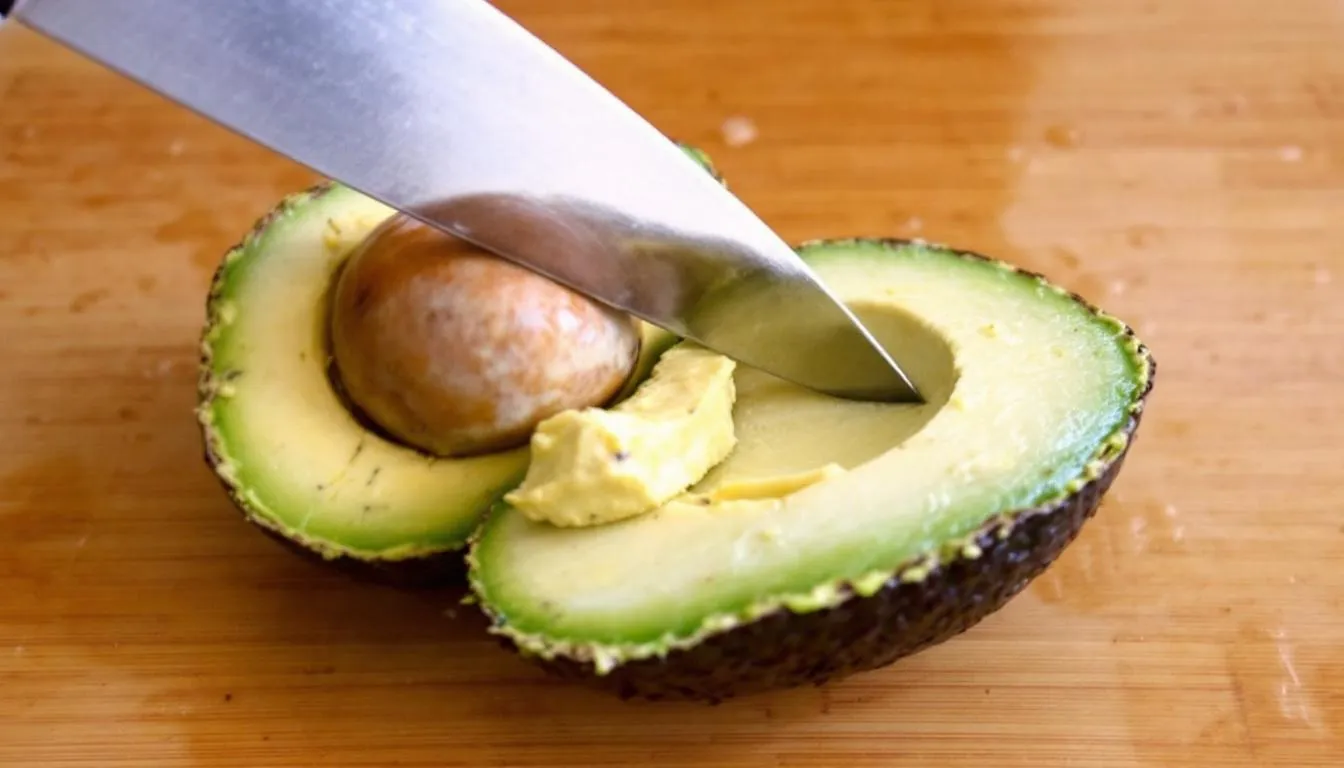

Key Takeaways
Avocado flesh is safe for dogs in small amounts, but moderation is crucial due to high fat content
- Avocado flesh is safe for dogs in small amounts, but moderation is crucial due to high fat content
- Avocado pits, skin, leaves, and bark contain persin toxin and should never be given to dogs
- The high fat content in avocados can trigger pancreatitis, a serious condition requiring immediate veterinary care
- Commercial dog food brands with avocado ingredients are safer alternatives than feeding fresh avocado
- Always consult your veterinarian before introducing avocado or any new foods to your dog’s diet
Avocado pits, skin, leaves, and bark contain persin toxin and should never be given to dogs
The high fat content in avocados can trigger pancreatitis, a serious condition requiring immediate veterinary care
Commercial dog food brands with avocado ingredients are safer alternatives than feeding fresh avocado
Always consult your veterinarian before introducing avocado or any new foods to your dog’s diet
The question “should dogs eat avocado?” has sparked considerable debate among pet owners. While this versatile fruit offers impressive health benefits for humans, the situation becomes more complex when considering our canine companions. Understanding the science behind avocado consumption for dogs requires examining both the nutritional advantages and potential health risks.
Dogs eat various human foods safely, but avocado presents unique considerations. The avocado fruit contains beneficial nutrients alongside compounds that can be problematic for some pets. This comprehensive guide will help you make informed decisions about whether your dog should have access to this popular superfood.
Can Dogs Safely Eat Avocado?
The direct answer is nuanced: small amounts of ripe avocado flesh are generally safe for most dogs, but several important caveats apply. When people ask whether dogs eat avocado safely, veterinarians emphasize that only the flesh portion should ever be considered, and even then, strict moderation is essential.
Dogs demonstrate significantly more resistance to persin toxicity compared to birds, horses, and cattle. This relative tolerance means that unlike other animals that can experience severe reactions from minimal exposure, most dogs can handle small amounts of avocado flesh without immediate danger. However, this doesn’t mean avocados should become a regular part of your dog’s diet.
The key principle governing avocado consumption for dogs is that it should remain an occasional treat rather than a dietary staple. Dogs with existing health conditions, particularly those affecting the pancreas or digestive system, should avoid avocado entirely. Additionally, dogs on prescription diets require veterinary approval before introducing any new foods, including avocado.
Individual sensitivity varies considerably among dogs. While one dog might enjoy small portions without issues, another may experience digestive upset from the same amount. This variability makes careful observation essential when introducing avocado to your pet’s routine.
Understanding Persin: The Avocado Toxin
Persin represents the primary concern when dogs eat avocado products. This fungicidal toxin called persin occurs naturally throughout the avocado plant, serving as the plant’s defense mechanism against harmful fungi and bacteria. Understanding persin’s distribution and effects helps explain why certain parts of the avocado pose greater risks than others.
The concentration of persin varies dramatically across different parts of the avocado plant. Avocado leaves, bark, avocado pits, and avocado peel contain the highest persin levels, making these components particularly dangerous for dogs. The avocado tree itself, including its branches and growing structures, also harbors significant persin concentrations.
In contrast, the avocado flesh contains much lower persin levels, especially in fully ripe fruit. This explains why many veterinarians consider small amounts of flesh relatively safe while strongly advising against other plant parts. However, even the reduced persin content in flesh can accumulate to problematic levels if dogs consume too much avocado.
When dogs experience persin poisoning, symptoms typically include vomiting, diarrhea, and stomach upset. More severe cases may involve difficulty breathing and fluid accumulation around the heart, though such extreme reactions are uncommon in dogs compared to other animals. The onset of symptoms usually occurs within 12-24 hours of consumption, making monitoring crucial during this period.


Health Benefits of Avocado for Dogs
Despite the risks, avocado flesh does offer legitimate nutritional benefits that explain why some dog food brands incorporate processed avocado ingredients. The fatty acids in avocado, particularly omega-3 and omega-9 compounds, can support coat and skin condition when consumed appropriately.
Avocado provides substantial amounts of vitamin E, a powerful antioxidant that supports immune system function and helps protect cells from oxidative damage. This vitamin also contributes to healthy skin and coat, potentially reducing issues like excessive shedding or dullness. Additionally, avocado contains vitamin K, essential for proper blood clotting and bone health.
The fruit also supplies B-vitamins, including B6, folate, riboflavin, and niacin, which support various metabolic processes. These nutrients help convert food into energy and maintain healthy nervous system function. Magnesium and potassium, both present in avocado, contribute to bone health, muscle function, and cardiovascular wellness.
However, these nutritional benefits must be weighed against the high fat content and potential risks. Many safer alternatives can provide similar nutrients without the complications associated with avocado consumption. Commercial dog foods already formulated with balanced nutrition typically provide adequate amounts of these vitamins and minerals.
Potential Risks and Dangers
The primary concern when dogs eat avocado stems from its exceptionally high fat content, approximately 15% by weight. This concentration makes avocado a significant risk factor for pancreatitis, a very serious condition involving inflammation of the pancreas. Dogs developing heart failure or those with pre-existing cardiovascular conditions face elevated risks from high fat foods like avocado.
Pancreatitis can range from mild digestive upset to life-threatening complications requiring intensive veterinary care. Symptoms include severe abdominal pain, persistent vomiting, diarrhea, lethargy, and loss of appetite. The condition can develop rapidly, particularly in dogs prone to digestive sensitivities or those with previous pancreatic episodes.
The avocado pit presents a major choking hazard and potential cause of intestinal blockage. These large, hard seeds cannot be digested and may become lodged in the dog’s intestinal tract, requiring emergency surgical removal. Such obstructions can quickly become fatal if not addressed promptly, making proper avocado disposal essential in homes with dogs.
Weight gain represents another significant concern, as avocado is extremely calorie dense. Regular consumption can quickly lead to obesity, which compounds risks for joint problems, diabetes, and cardiovascular disease. Even small amounts can contribute substantially to a dog’s daily caloric intake.
Rare but serious complications include myocardial damage from excessive persin intake, though documented cases in dogs remain uncommon. However, the potential for such severe reactions reinforces the importance of strict moderation and veterinary guidance.
Safe Serving Guidelines and Portions
When considering how much avocado a dog can safely consume, veterinarians typically recommend no more than one teaspoon per 10 pounds of body weight as an absolute maximum. This guideline applies only to properly prepared avocado flesh, with all potentially dangerous components removed.
Proper preparation involves completely removing the avocado pit, skin, and any brown or discolored portions of the flesh. The remaining green flesh should be cut into small, manageable pieces appropriate for your dog’s size. Never offer avocado in large chunks that could present choking risks.
Frequency guidelines suggest limiting avocado treats to no more than once or twice per week, and only occasion rather than as a regular dietary component. This infrequent schedule helps prevent accumulation of fat and persin while allowing dogs to potentially benefit from the nutritional content.
Gradual introduction is essential when first offering avocado to your dog. Start with tiny amounts – perhaps a quarter teaspoon for medium-sized dogs – and monitor closely for any adverse reactions. Watch for changes in appetite, energy level, stool quality, or any signs of digestive distress over the following 24-48 hours.
Signs to monitor after feeding include normal behavior patterns, maintained appetite, and regular bowel movements. Any deviation from typical patterns warrants immediate attention and potential veterinary consultation.


What to Do if Your Dog Eats Too Much Avocado
If your dog ate avocado in quantities exceeding safe guidelines, immediate assessment becomes crucial. First, determine exactly what parts of the avocado were consumed and estimate the total amount. If your dog eats avocado pit or skin, contact your vet immediately regardless of the quantity.
For flesh-only consumption, monitor your pet closely for 24-48 hours while watching for symptoms of distress. Normal activities like eating, drinking, playing, and bathroom habits should continue without significant changes. Document any concerning behaviors or symptoms to report to your veterinarian.
Emergency situations requiring immediate veterinary attention include persistent vomiting, severe diarrhea, signs of abdominal pain (hunched posture, reluctance to move), difficulty breathing, or extreme lethargy. These symptoms may indicate pancreatitis, intestinal obstruction, or serious health problems requiring professional intervention.
Contact your vet immediately if you observe choking, attempts to vomit without producing anything, excessive drooling, or signs of severe discomfort. Don’t wait to see if symptoms resolve on their own, as delays can worsen outcomes significantly.
Prevention strategies include storing avocados securely away from curious dogs, disposing of pits and peels in dog-proof containers, and educating family members about the risks of sharing avocado-containing foods with pets.
Avocado Oil for Dogs
When dogs eat avocado oil, they typically encounter fewer risks than with fresh fruit consumption. Avocado oil safe products contain minimal persin compared to fresh avocado flesh, as the processing methods used to extract oil naturally reduce toxin concentrations.
The benefits of avocado oil include concentrated vitamin E and beneficial fatty acids that can support skin health and coat shine. Many commercial dog supplements and topical products incorporate avocado oil specifically for these properties. The oil provides omega-3 and omega-9 fatty acids in forms that dogs can readily utilize.
However, avocado oil remains extremely high in calories, containing approximately 120 calories per tablespoon. This caloric density means that even small amounts can contribute significantly to weight gain if used regularly. Dogs receiving avocado oil should have their overall caloric intake carefully monitored.
Veterinary consultation remains important before introducing avocado oil to your dog’s routine. Some dogs may still experience digestive upset from the high fat content, particularly those with sensitive stomachs or previous pancreatic issues.
Quality matters significantly with avocado oil products. Choose cold-pressed, pure avocado oil without additives, preservatives, or other ingredients that might be harmful to dogs. Avoid any products containing artificial flavors or seasonings.
Guacamole and Other Avocado Products
The question of whether dogs eat guacamole has a clear answer: absolutely not. Traditional hearty guacamole contains multiple ingredients that are toxic to dogs, making it far more dangerous than plain avocado flesh. Onions and garlic, common guacamole ingredients, can cause severe anemia and other serious health issues in dogs.
Salt content in guacamole and other avocado products poses additional risks, particularly for dogs with cardiovascular or kidney conditions. Even dogs without pre-existing conditions can experience sodium toxicity from excessive salt intake. Lime juice, another common ingredient, can cause stomach upsets and digestive problems.
Avocado-based dips, spreads, and restaurant preparations typically contain seasonings, preservatives, and other additives that may be harmful to dogs. These processed avocado products should be avoided entirely, regardless of the avocado content.
Commercial avocado products marketed for human consumption often include ingredients specifically toxic to dogs. Always read ingredient lists carefully and assume that any seasoned or processed avocado product is inappropriate for canine consumption.
If you want to share avocado-like treats with your dog, stick to plain, fresh avocado flesh prepared specifically for your pet. This approach eliminates the risks associated with additives while providing any potential nutritional benefits.
Commercial Dog Foods with Avocado
Many commercial dog food brands now include avocado meal, avocado oil, or other processed avocado ingredients in their formulations. These products undergo extensive safety testing and processing methods designed to minimize persin content while retaining beneficial nutrients.
Popular brands incorporating avocado ingredients include AvoDerm, Blue Buffalo Wilderness, and certain Wellness formulations. These manufacturers use specific processing techniques that significantly reduce persin levels compared to fresh fruit. The avocado meal used in these foods typically comes from flesh only, with pits and skins completely excluded.
The processing methods employed by reputable dog food manufacturers involve heating, grinding, and other treatments that help neutralize potential toxins while preserving valuable nutrients. This controlled approach allows dogs to benefit from avocado’s nutritional profile without the risks associated with fresh consumption.
These commercial dog food options provide a safer alternative to feeding fresh avocado directly. The balanced diet formulations ensure appropriate portions while incorporating other nutrients that complement avocado’s benefits. Dogs consuming these foods receive consistent, measured amounts rather than variable portions that might exceed safe limits.
When choosing commercial dog foods containing avocado, select products from established manufacturers with strong safety records. Look for AAFCO (Association of American Feed Control Officials) approval and avoid brands with histories of recalls or quality control issues.


Alternative Healthy Treats for Dogs
Rather than risking the complications associated with avocado, numerous safer alternatives can provide similar nutritional benefits. Safe human foods for dogs include blueberries, which offer antioxidants and vitamins without the high fat content or toxicity concerns.
Strawberries provide vitamin C and fiber while remaining low in calories, making them excellent occasional treats. Apple slices (with seeds and core removed) offer fiber and vitamins, though they should be given in moderation due to natural sugar content. Bananas provide potassium and vitamin B6 but should be limited due to their sugar content.
Vegetable alternatives include carrots, which provide beta-carotene and help with dental health through their natural abrasive action. Green beans offer fiber and vitamins with very few calories, making them ideal for dogs needing weight management. Sweet potato provides beta-carotene, fiber, and various vitamins when cooked and served plain.
Lean protein treats like cooked chicken, turkey, or fish provide high-quality nutrition without the risks associated with high-fat plant foods. These options support muscle maintenance and provide essential amino acids dogs need for optimal health.
Commercial healthy treat options specifically formulated for dogs often provide similar nutritional benefits to avocado without any associated risks. These products undergo safety testing and nutritional balancing to ensure they complement rather than disrupt your dog’s balanced diet.
Commercial Dog Foods with Avocado
The inclusion of avocado ingredients in commercial dog food represents a carefully controlled approach to providing nutritional benefits while minimizing risks. Reputable manufacturers employ specific processing methods that significantly reduce persin content compared to fresh avocado fruit.
Processing techniques used by dog food companies include heating treatments, mechanical processing, and careful selection of avocado parts. Most commercial applications use only the flesh portion, completely excluding pits, skins, and leaves where persin concentrations are highest. These methods help neutralize potential toxins while preserving beneficial fatty acids and vitamins.
Quality control measures in commercial dog food production include regular testing for persin levels, nutritional analysis, and safety verification. Established brands maintain strict standards to ensure their avocado-containing products meet safety requirements while providing nutritional value.
The nutritional balancing in commercial formulations ensures that avocado ingredients complement other nutrients rather than creating imbalances. Professional pet nutritionists design these formulas to provide complete nutrition while avoiding the pitfalls of feeding whole avocado to dogs.
When selecting commercial dog foods with avocado ingredients, choose products from manufacturers with strong safety records and transparent ingredient sourcing. Look for brands that provide detailed information about their processing methods and quality control procedures.
Alternative Healthy Treats for Dogs
Safer fruit options provide many of the same nutritional benefits as avocado without the associated risks. Blueberries offer powerful antioxidants, vitamin C, and fiber while remaining low in calories and completely safe for dogs. These small fruits make excellent training treats and can be fed fresh or frozen.
Strawberries provide vitamin C, fiber, and natural enzymes that support digestive health. Remove the green tops before serving, and offer only in moderation due to natural sugar content. Apple slices (without seeds or core) provide fiber and vitamins while helping clean teeth naturally.
Vegetable alternatives offer excellent nutritional value with minimal risk. Carrots provide beta-carotene for eye health and their crunchy texture helps maintain dental health. Green beans offer fiber, vitamins, and very few calories, making them ideal for dogs requiring weight management.
Sweet potato, when cooked and served plain, provides beta-carotene, fiber, and various B vitamins. This vegetable offers natural sweetness that many dogs enjoy while supporting digestive health and providing steady energy.
Lean protein treats like cooked chicken breast, turkey, or fish provide high-quality nutrition without excessive fat content. These options support muscle maintenance and provide essential amino acids necessary for optimal canine health.
Commercial healthy treat options specifically designed for dogs often provide similar nutritional benefits to avocado while eliminating all associated risks. These products undergo rigorous testing and nutritional balancing to ensure they enhance rather than compromise your dog’s diet.
Remember that all treats, regardless of their health benefits, should comprise no more than 10% of your dog’s total daily caloric intake. This guideline helps maintain nutritional balance while allowing for enjoyable variety in your pet’s diet.
FAQ
Can puppies eat avocado?
Puppies should generally avoid avocado due to their more sensitive digestive systems and smaller body size. Young dogs are more susceptible to digestive upset from high-fat foods and may experience more severe reactions to persin. Additionally, puppies require carefully balanced nutrition for proper growth and development, making it better to focus on puppy-specific foods rather than introducing potentially problematic treats. If you’re considering avocado for a puppy, consult your veterinarian first and wait until the dog reaches full adult size and digestive maturity.
Are there dog breeds that should completely avoid avocado?
Certain breeds with predispositions to pancreatitis, such as Miniature Schnauzers, Yorkshire Terriers, and Cocker Spaniels, should avoid high-fat foods like avocado entirely. Additionally, breeds prone to weight gain, including Labrador Retrievers, Beagles, and Bulldogs, may be better served with lower-calorie treat alternatives. Dogs with genetic predispositions to heart conditions should also avoid avocado due to its high fat content. Always discuss breed-specific dietary considerations with your veterinarian.
How long does it take for avocado toxicity symptoms to appear?
Symptoms of persin toxicity typically appear within 12-24 hours of consumption, though onset can vary based on the amount consumed and individual sensitivity. Digestive symptoms like vomiting and diarrhea usually appear first, followed by other signs of distress. However, symptoms from pancreatitis (triggered by high fat content) may take 24-72 hours to develop fully. If your dog has consumed avocado, monitor closely for at least 48 hours and contact your veterinarian if any concerning symptoms appear.
Can dogs develop allergies to avocado over time?
Yes, dogs can develop food allergies to avocado or any other food, even after consuming it safely previously. Food allergies in dogs typically develop through repeated exposure over time. Signs of avocado allergy include persistent itching, skin reactions, digestive upset, or respiratory symptoms that occur consistently after consumption. If you suspect your dog has developed an avocado allergy, discontinue feeding it immediately and consult your veterinarian for proper allergy testing and management strategies.
What’s the difference between persin toxicity and pancreatitis from avocado?
Persin toxicity results from the natural fungicidal compound in avocado and typically causes gastrointestinal symptoms like vomiting, diarrhea, and respiratory distress in severe cases. Pancreatitis, on the other hand, results from the high fat content in avocado and involves inflammation of the pancreas, causing severe abdominal pain, persistent vomiting, and potentially life-threatening complications. While persin toxicity is relatively rare in dogs due to their natural resistance, pancreatitis represents a more common and serious risk from avocado consumption, especially in predisposed animals.
FAQ
Can puppies eat avocado?
Puppies should generally avoid avocado due to their more sensitive digestive systems and smaller body size. Young dogs are more susceptible to digestive upset from high-fat foods and may experience more severe reactions to persin. Additionally, puppies require carefully balanced nutrition for proper growth and development, making it better to focus on puppy-specific foods rather than introducing potentially problematic treats. If you’re considering avocado for a puppy, consult your veterinarian first and wait until the dog reaches full adult size and digestive maturity.
Are there dog breeds that should completely avoid avocado?
Certain breeds with predispositions to pancreatitis, such as Miniature Schnauzers, Yorkshire Terriers, and Cocker Spaniels, should avoid high-fat foods like avocado entirely. Additionally, breeds prone to weight gain, including Labrador Retrievers, Beagles, and Bulldogs, may be better served with lower-calorie treat alternatives. Dogs with genetic predispositions to heart conditions should also avoid avocado due to its high fat content. Always discuss breed-specific dietary considerations with your veterinarian.
How long does it take for avocado toxicity symptoms to appear?
Symptoms of persin toxicity typically appear within 12-24 hours of consumption, though onset can vary based on the amount consumed and individual sensitivity. Digestive symptoms like vomiting and diarrhea usually appear first, followed by other signs of distress. However, symptoms from pancreatitis (triggered by high fat content) may take 24-72 hours to develop fully. If your dog has consumed avocado, monitor closely for at least 48 hours and contact your veterinarian if any concerning symptoms appear.
Can dogs develop allergies to avocado over time?
Yes, dogs can develop food allergies to avocado or any other food, even after consuming it safely previously. Food allergies in dogs typically develop through repeated exposure over time. Signs of avocado allergy include persistent itching, skin reactions, digestive upset, or respiratory symptoms that occur consistently after consumption. If you suspect your dog has developed an avocado allergy, discontinue feeding it immediately and consult your veterinarian for proper allergy testing and management strategies.
What’s the difference between persin toxicity and pancreatitis from avocado?
Persin toxicity results from the natural fungicidal compound in avocado and typically causes gastrointestinal symptoms like vomiting, diarrhea, and respiratory distress in severe cases. Pancreatitis, on the other hand, results from the high fat content in avocado and involves inflammation of the pancreas, causing severe abdominal pain, persistent vomiting, and potentially life-threatening complications. While persin toxicity is relatively rare in dogs due to their natural resistance, pancreatitis represents a more common and serious risk from avocado consumption, especially in predisposed animals.






